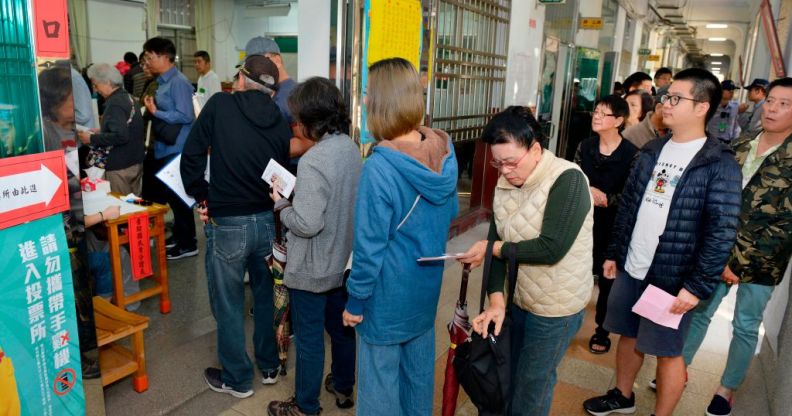After Taiwan rejected same-sex marriage, what’s next for LGBT people?

Residents queue outside a polling station at an elementary school on November 24, 2018. (CHRIS STOWERS/AFP/Getty)
Last month, Taiwan voters rejected referendum propositions on same-sex marriage rights and LGBTI-inclusive education in schools, causing a shockwave through activist circles. Many previously considered Taiwan as a leader of LGBTI rights in Asia, but some, including Zak Huang, are now questioning this position.
The night of the referendum, I couldn’t go home right away. I was in shock and crying and couldn’t face my parents. I haven’t come out to them and suspected they voted differently from me.
As I rode the train back to Taipei the next day, I felt like the whole carriage was mocking me. Every face I saw could be one of the millions who voted against us.
It was not until after the referendum that so many of us got to understand how much of a bubble we had been living in. We were only speaking within the echo chamber of our Facebook algorithm. Of course, we knew we had to reach out beyond our community, but we overestimated our ability to have our voices heard across the social spectrum. It was a bitter realisation.
Fake news and misinformation were key factors behind the referendum results. Homophobic groups flooded the public with misinformation about LGBTI people, and neither the words of experts nor sound statistics were able to counter the homophobic momentum.
What caught the attention of conservatives and brought them out to vote in droves was the motion on school education – namely, “whether or not national education should include gender equality, emotional education, sex education and same-sex education.”
This question triggered fear among parents as anti-LGBTI misinformation was spreading. Many parents might not be against LGBTI people, but they started to worry when it came to their own children. They were being told that schools were teaching their children how to be gay, how to have sex and how to become sexual predators. It was no surprise that many worrying parents voted against same-sex marriage.
“Fake news and misinformation were key factors behind the referendum results.”
— Zak Huang
Homophobic groups also had massive financial support from anti-marriage-equality groups. As a result, they had abundant resources to produce campaigns, advertise and mobilise, while LGBTI groups had to work really hard to raise funds.
Taiwan same-sex marriage referendum: what’s next?
As I was riding the train and hiding from the gaze of fellow commuters, my attention was drawn to a message in my Facebook “bubble” written by veteran LGBTI activist Chi Chia-wei.
He said that the number of people who oppose us is dropping year by year, and people who support us is continually on the rise. There’s been so much progress, compared to 30 years ago, so there’s nothing to be sad and disappointed about. In fact, we should celebrate with a bottle of champagne. Things can only get better.
Yes, the campaign should carry on. One day love will win. It just takes time.
Zak Huang is a digital campaigner at Amnesty International Taiwan.

